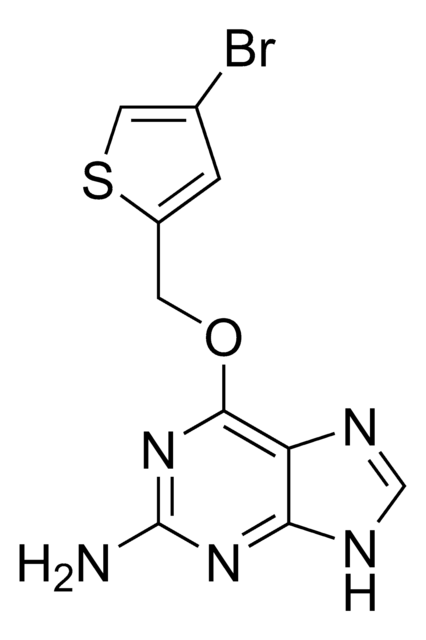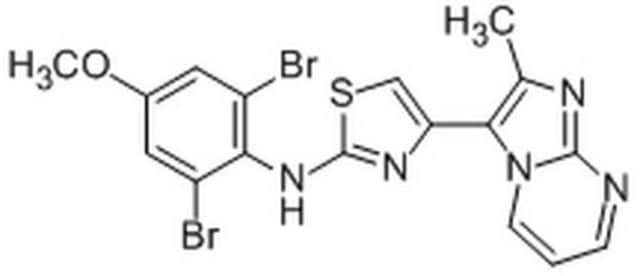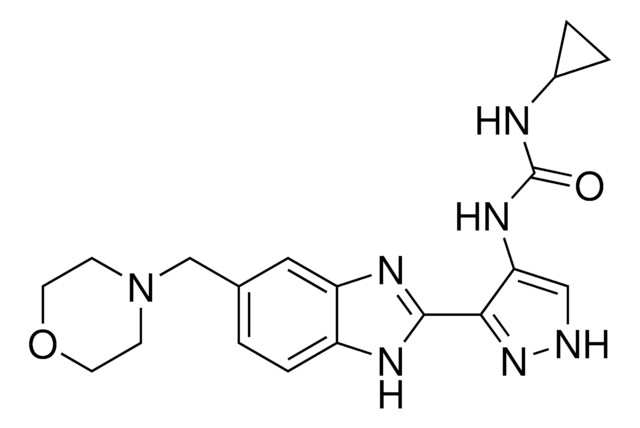SML1143
PTC-209
≥98% (HPLC)
Sinónimos:
N-(2,6-Dibromo-4-methoxyphenyl)-4-(2-methylimidazo[1,2-a]pyrimidin-3-yl)-2-thiazolamine
About This Item
Productos recomendados
Quality Level
assay
≥98% (HPLC)
form
powder
color
white to brown
solubility
DMSO: 20 mg/mL, clear
storage temp.
2-8°C
SMILES string
BrC1=CC(OC)=CC(Br)=C1NC2=NC(C3=C(C)N=C4N3C=CC=N4)=CS2
InChI
1S/C17H13Br2N5OS/c1-9-15(24-5-3-4-20-16(24)21-9)13-8-26-17(22-13)23-14-11(18)6-10(25-2)7-12(14)19/h3-8H,1-2H3,(H,22,23)
InChI key
XVOOCQSWCCRVDY-UHFFFAOYSA-N
Application
- the cell viability of canine osteosarcoma (OSA) cell lines
- lipidated microtubule-associated protein 1 light chain 3 (LC3B-II) and Sequestosome 1 (SQSTM1) protein levels in ovarian cancer (OvCa) cells
- cardiac reprogramming efficiency in mouse embryonic fibroblasts (MEF)
Biochem/physiol Actions
Features and Benefits
Storage Class
11 - Combustible Solids
wgk_germany
WGK 3
flash_point_f
Not applicable
flash_point_c
Not applicable
Certificados de análisis (COA)
Busque Certificados de análisis (COA) introduciendo el número de lote del producto. Los números de lote se encuentran en la etiqueta del producto después de las palabras «Lot» o «Batch»
¿Ya tiene este producto?
Encuentre la documentación para los productos que ha comprado recientemente en la Biblioteca de documentos.
Artículos
We offer a variety of small molecule research tools, such as transcription factor modulators, inhibitors of chromatin modifying enzymes, and agonists/antagonists for target identification and validation in gene regulation research; a selection of these research tools is shown below.
We offer a variety of small molecule research tools, such as transcription factor modulators, inhibitors of chromatin modifying enzymes, and agonists/antagonists for target identification and validation in gene regulation research; a selection of these research tools is shown below.
We offer a variety of small molecule research tools, such as transcription factor modulators, inhibitors of chromatin modifying enzymes, and agonists/antagonists for target identification and validation in gene regulation research; a selection of these research tools is shown below.
We offer a variety of small molecule research tools, such as transcription factor modulators, inhibitors of chromatin modifying enzymes, and agonists/antagonists for target identification and validation in gene regulation research; a selection of these research tools is shown below.
Nuestro equipo de científicos tiene experiencia en todas las áreas de investigación: Ciencias de la vida, Ciencia de los materiales, Síntesis química, Cromatografía, Analítica y muchas otras.
Póngase en contacto con el Servicio técnico







